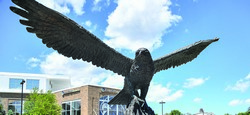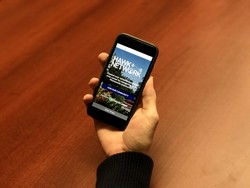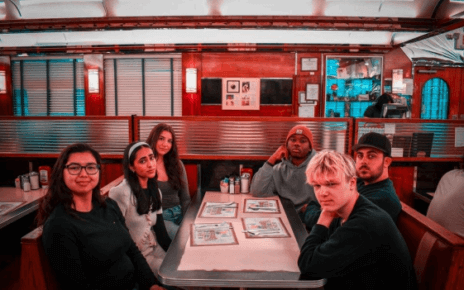The University is soon to invite students to the “Hawk Network,” a digital community for professional networking and development available to undergraduates and alumni alike, on Mar. 2.
Users will be able to search and filter fellow Hawks by industry, professional experience, general location and more. Built-in video conferencing tools, as well as connection through email and text, allow the site’s users to “build meaningful mentoring relationships,” the official Hawk Network FAQ states.
William Hill, Assistant Dean of Career Services, considers the Hawk Network to be a “game-changer for Monmouth.”
“This system harnesses the potential networking power of tens of thousands of alumni and students in a robust yet user-friendly website,” Hill said. “Over time the possibilities for career connections and advice is nearly endless. Initial response from alumni has been overwhelming, with over 700 signing up in the first two weeks since launch. I am confident Hawk Network will have an important impact on our current and future students’ professional success.”
Jeffery Mass, Assistant Director of Career Services, considers Hawk Network to be a tool which will allow students and alumni to succeed before, during and after Monmouth.
“Students are able to gain networking contacts by connecting with alumni and friends of the University. Hawk Network also offers resources to help budding professionals as well as a forum for users to discuss how they have navigated their own personal career development.
 Mike Fazzino, senior communication student and SGA President, considers the Hawk Network to be a phenomenal way for alumni and students to come together. “It’s just such a great way for students to make connections, establish relationships, seek advice, and hopefully find their dream job.”
Mike Fazzino, senior communication student and SGA President, considers the Hawk Network to be a phenomenal way for alumni and students to come together. “It’s just such a great way for students to make connections, establish relationships, seek advice, and hopefully find their dream job.”
Alumni will have exclusive access to a secure digital directory of fellow graduated Hawks. The network’s Groups function also allows for users to participate in closed discussions regarding specific interests, industries, events and locations.
Amanda Klaus, Executive Director of Alumni Engagement and Annual Giving, detailed the upwards of 20 groups soon to populate the site and the usefulness of these miniature communities.
“Let’s say, there’s a scholarly article or a cool post that comes up online that somebody wants to put out there, [with the groups function] people comment on it,” Klaus said. “It helps people to critically think and have meaningful discussions, may it be based on a topic, shared interest or an industry. We’ll continue to populate them as this rolls out.”
You create a profile in a similar vein to LinkedIn, but users select preferences to indicate the type of experience they are seeking, Klaus said. “You may be open to having a mentor, or just someone open to having a chat and bouncing ideas off with.”
The site then asks a further question concerning the specific criteria a user needs help with, whether it be an opinion on the quality of a resume or tips for mock interviewing, Klaus said. Users can also search for one another utilizing a “heat map,” in which you are able to see other users near the physical area you reside in.
The network’s Job Referral Board allows for users to explore job opportunities seen only by those within the confines of the site, even going so far as to allow users to attach their resumes and receive alerts when job postings align with their specific criteria.
“It’s all about the element of ‘who you know’,” Klaus said. “It’s a really easy and convenient way for folks to post job opportunities, and you as a student to explore them in a very casual setting. It’s not a formal posting they need to go through, and career services is our partner on that feature.”
The Hawk Network came to fruition as a result of Robert D. McCaig, Vice President for Enrollment Management, and his retention team’s data analysis concerning the state of the student population and the ways in which the University can keep graduated students connected.
“We needed to be in the space [current students] are in, which is the digital world,” Klaus said. “We didn’t have any kind of platform or outlet to allow for all of that to happen. Through the retention team and their efforts, and in speaking with career services and our collaboration, we noticed there’s a couple platforms out there that other Universities are utilizing, allowing for all of this to happen organically. Whether it be from your mobile device or from your computer, people engage with each other more often than waiting for an event to happen or a career fair to occur. These things can happen and they can be ongoing.”
The University eventually formed a partnership with software company People Grove to create a Monmouth oriented digital community over the past 8 months. A soft launch was tested in January with a small number of alumni, employees, faculty and staff, as “… any time you develop a new software you need to make sure it works properly,” Klaus explained.
The focus of the soft launch was to create a robust and diverse population of users related to a wide array of industries before students entered the site, Klaus said.This method will allow the “search and filter” function of the site to prove more useful in the early days of the network.
“At the end of the day, the reason Monmouth University exists is to educate and propel our students into a successful career,” Klaus said. “We want them to have experienced a well-lived life after they put to rest their undergraduate or graduate degree here. Yes, going to college is an investment, but what’s your return on investment? It should be the lifelong connections that you make. Monmouth doesn’t just disappear after you turn your tassel, Monmouth is going to be a lifelong relationship.”
The University is soon to invite students to the “Hawk Network,” a digital community for professional networking and development available to undergraduates and alumni alike, on Mar. 2.
Users will be able to search and filter fellow Hawks by industry, professional experience, general location and more. Built-in video conferencing tools, as well as connection through email and text, allow the site’s users to “build meaningful mentoring relationships,” the official Hawk Network FAQ states.
William Hill, Assistant Dean of Career Services, considers the Hawk Network to be a “game-changer for Monmouth.”
“This system harnesses the potential networking power of tens of thousands of alumni and students in a robust yet user-friendly website,” Hill said. “Over time the possibilities for career connections and advice is nearly endless. Initial response from alumni has been overwhelming, with over 700 signing up in the first two weeks since launch. I am confident Hawk Network will have an important impact on our current and future students’ professional success.”
Jeffery Mass, Assistant Director of Career Services, considers Hawk Network to be a tool which will allow students and alumni to succeed before, during and after Monmouth.
“Students are able to gain networking contacts by connecting with alumni and friends of the University. Hawk Network also offers resources to help budding professionals as well as a forum for users to discuss how they have navigated their own personal career development.
Mike Fazzino, senior communication student and SGA President, considers the Hawk Network to be a phenomenal way for alumni and students to come together. “It’s just such a great way for students to make connections, establish relationships, seek advice, and hopefully find their dream job.”
Alumni will have exclusive access to a secure digital directory of fellow graduated Hawks. The network’s Groups function also allows for users to participate in closed discussions regarding specific interests, industries, events and locations.
Amanda Klaus, Executive Director of Alumni Engagement and Annual Giving, detailed the upwards of 20 groups soon to populate the site and the usefulness of these miniature communities.
“Let’s say, there’s a scholarly article or a cool post that comes up online that somebody wants to put out there, [with the groups function] people comment on it,” Klaus said. “It helps people to critically think and have meaningful discussions, may it be based on a topic, shared interest or an industry. We’ll continue to populate them as this rolls out.”
You create a profile in a similar vein to LinkedIn, but users select preferences to indicate the type of experience they are seeking, Klaus said. “You may be open to having a mentor, or just someone open to having a chat and bouncing ideas off with.”
The site then asks a further question concerning the specific criteria a user needs help with, whether it be an opinion on the quality of a resume or tips for mock interviewing, Klaus said. Users can also search for one another utilizing a “heat map,” in which you are able to see other users near the physical area you reside in.
The network’s Job Referral Board allows for users to explore job opportunities seen only by those within the confines of the site, even going so far as to allow users to attach their resumes and receive alerts when job postings align with their specific criteria.
“It’s all about the element of ‘who you know’,” Klaus said. “It’s a really easy and convenient way for folks to post job opportunities, and you as a student to explore them in a very casual setting. It’s not a formal posting they need to go through, and career services is our partner on that feature.”
The Hawk Network came to fruition as a result of Robert D. McCaig, Vice President for Enrollment Management, and his retention team’s data analysis concerning the state of the student population and the ways in which the University can keep graduated students connected.
“We needed to be in the space [current students] are in, which is the digital world,” Klaus said. “We didn’t have any kind of platform or outlet to allow for all of that to happen. Through the retention team and their efforts, and in speaking with career services and our collaboration, we noticed there’s a couple platforms out there that other Universities are utilizing, allowing for all of this to happen organically. Whether it be from your mobile device or from your computer, people engage with each other more often than waiting for an event to happen or a career fair to occur. These things can happen and they can be ongoing.”
The University eventually formed a partnership with software company People Grove to create a Monmouth oriented digital community over the past 8 months. A soft launch was tested in January with a small number of alumni, employees, faculty and staff, as “… any time you develop a new software you need to make sure it works properly,” Klaus explained.
The focus of the soft launch was to create a robust and diverse population of users related to a wide array of industries before students entered the site, Klaus said.This method will allow the “search and filter” function of the site to prove more useful in the early days of the network.
“At the end of the day, the reason Monmouth University exists is to educate and propel our students into a successful career,” Klaus said. “We want them to have experienced a well-lived life after they put to rest their undergraduate or graduate degree here. Yes, going to college is an investment, but what’s your return on investment? It should be the lifelong connections that you make. Monmouth doesn’t just disappear after you turn your tassel, Monmouth is going to be a lifelong relationship.”
PHOTO TAKEN by Nicole Riddle
IMAGE COURTESY of Monmouth Athletics



